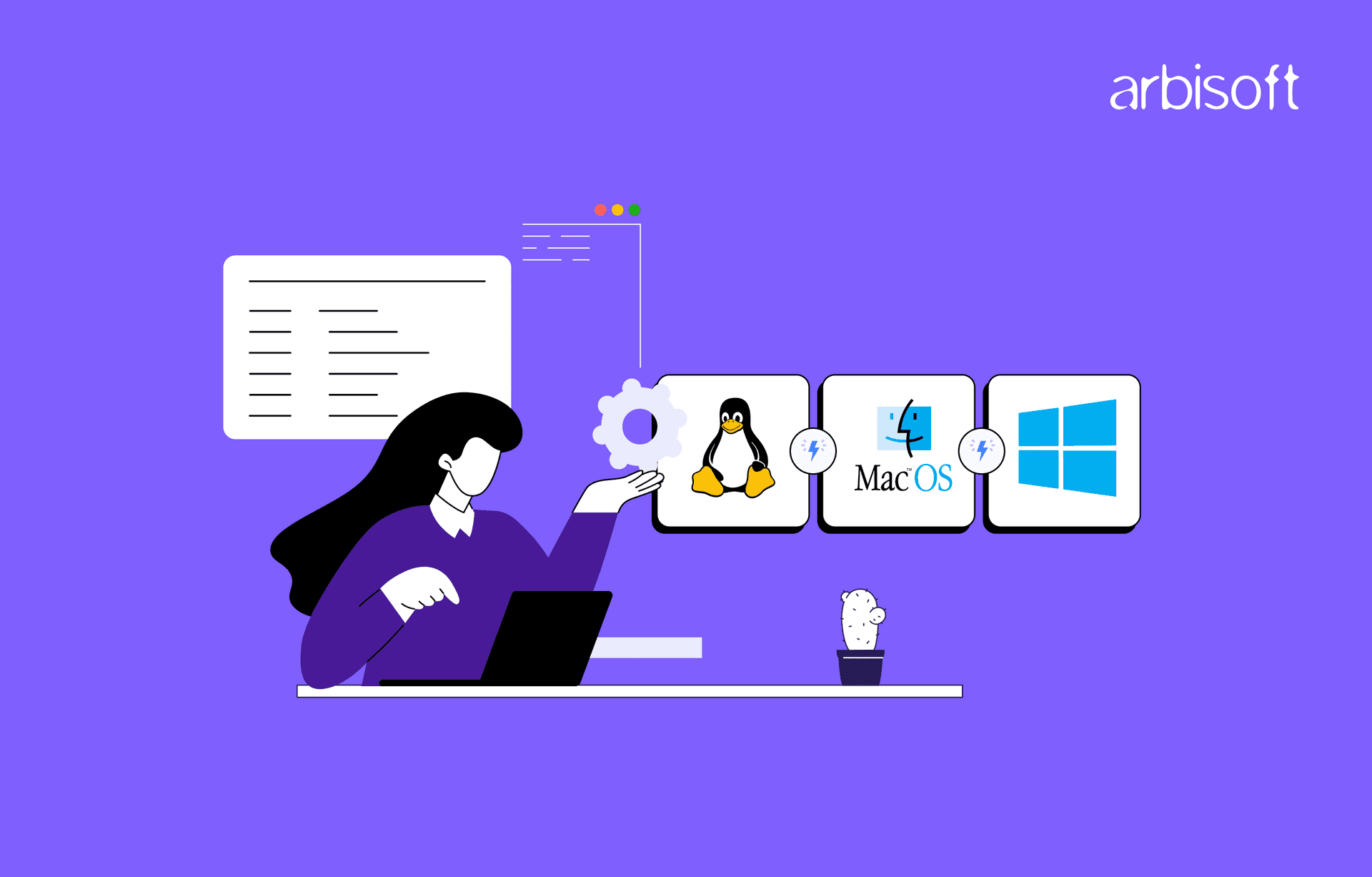We put excellence, value and quality above all - and it shows




A Technology Partnership That Goes Beyond Code

“Arbisoft has been my most trusted technology partner for now over 15 years. Arbisoft has very unique methods of recruiting and training, and the results demonstrate that. They have great teams, great positive attitudes and great communication.”
Linux vs. Mac vs. Windows: Is There a Definitive Programming Operating System?

Choosing the right operating system is no small feat. We’ve all heard the hype about how a ‘specific’ OS can revolutionize your workflow. But let’s be honest, not every OS is a perfect fit.
From sluggish performance to missing features, the wrong choice can turn your coding journey into a frustrating uphill battle. With Linux, macOS, and Windows vying for developer attention, it’s time to cut through the noise and determine which OS truly delivers on its promises. Your choice of OS can influence how seamlessly you integrate external software development services, ensuring your projects meet both functional and performance requirements.
Let's dive in and find out.
Linux - The Programmer's Workhorse
Linux, an open-source operating system, has earned a stellar reputation among programmers for several compelling reasons.
- Free to Use - As an open-source platform, Linux is entirely free to use and distribute, making it an attractive option for developers on a budget.
- Customization - Linux offers unparalleled flexibility, allowing programmers to tailor their environment precisely to their needs, from kernel configuration to desktop customization.
- Performance - Renowned for its efficiency and speed, Linux is often the preferred choice for performance-critical applications and tasks.
- Robust Community - A vast and active community of developers contributes to Linux's growth and provides an invaluable resource for problem-solving and knowledge sharing.
- Security - Built with security as a core principle, Linux offers a robust and adaptable security architecture, making it a preferred choice for handling sensitive data.
- Server Dominance - Linux powers a majority of the world's servers, providing developers with a platform to build and deploy scalable applications.
- Command-Line Proficiency - Linux fosters a strong command-line culture, empowering developers with precise control over their system and enhancing productivity.
While Linux presents numerous advantages, it's essential to acknowledge potential challenges too.
- Linux often requires a steeper learning curve compared to more user-friendly OSes, which might deter some users.
- While improved now, Linux can sometimes exhibit compatibility issues with specific hardware devices or drivers.
- Although extensive, the availability of certain commercial software applications might be limited compared to Windows or macOS.
macOS - The Apple Ecosystem Advantage
macOS, Apple's operating system, has carved a niche for itself in the developer community, particularly among those who value aesthetics, user experience, and seamless integration.
- Elegant User Interface - macOS features a visually appealing and intuitive interface, enhancing the overall development experience.
- Hardware Integration - The tight integration between macOS and Apple hardware often results in superior performance and reliability.
- Robust Ecosystem - The App Store provides a curated selection of development tools and software, simplifying the setup process.
- Strong Developer Tools - Apple offers a suite of powerful development tools, including Xcode for iOS and macOS app development.
- Design Focus - macOS emphasizes design principles, making it an ideal choice for developers working on user-centric applications.
However, it's essential to consider the following factors too.
- Apple hardware typically comes with a premium price tag.
- Compared to Linux, macOS offers less flexibility in terms of system customization.
- The App Store's gatekeeping process might impose limitations on certain types of software.
Windows - The Universal Platform
Windows, the most widely used operating system globally, offers a unique blend of accessibility and versatility for developers.
- Massive User Base - The extensive user base translates to a vast market for software applications.
- Game Development Dominance - Windows remains the primary platform for game development, offering powerful tools and hardware support.
- Strong Commercial Software Ecosystem - A wide array of commercial development tools and software is available for Windows.
- Improving Developer Focus - Microsoft has made significant strides in enhancing Windows for developers, with features like WSL2.
Windows also comes with its own share of challenges.
- Historically, Windows has faced criticism for performance issues, although recent improvements have mitigated this to some extent.
- The diverse range of Windows versions can sometimes lead to compatibility issues.
- Windows has a history of security vulnerabilities, although Microsoft has invested heavily in improving security.
Want a quick breakdown of these OS features?
Download an all-in-one comparison

Pick an OS that fits you best!
Take a look at all these features in one quick glance!

In-Depth Comparison - Key Factors
Choosing the right OS for your development journey involves a meticulous evaluation of several critical factors:
Performance - More than Just Speed
While raw processing power is essential, overall system responsiveness, application launch times, and efficient resource utilization are equally important. Factors such as:
- Hardware optimization - How well does the OS leverage the capabilities of modern CPUs, GPUs, and SSDs?
- Background processes - The impact of system services and background tasks on overall performance.
- Virtualization performance - For those using virtual machines or containers, the OS's virtualization capabilities are crucial.
Tooling and Ecosystem
The availability and quality of development tools, integrated development environments (IDEs), debuggers, version control systems, and libraries are paramount. Key considerations include:
- IDE and tool compatibility - How well do popular IDEs and development tools integrate with the OS?
- Package management - The efficiency of installing, updating, and managing software packages.
- Cloud integration - How seamlessly does the OS integrate with cloud platforms for development, deployment, and collaboration?
- Open-source support - The availability of open-source tools and libraries can be a significant factor for cost-conscious developers.
Cost - More Than Just the Price Tag
While the upfront cost of hardware and software is essential, consider the total cost of ownership (TCO), including:
- Licensing fees for commercial software and OS versions.
- The frequency and cost of hardware replacements or upgrades.
- The impact of the OS on developer efficiency and time-to-market can significantly influence overall costs.
- If leveraging cloud-based services, consider the associated costs.
Community and Support
A strong developer community provides invaluable resources, troubleshooting assistance, and opportunities for collaboration. Factors to consider include:
- The number of developers and the frequency of interactions within the community.
- Availability of documentation, forums, and tutorials.
- The ecosystem of third-party developers and service providers.
Integration - A Seamless Workflow
How well your OS integrates with other tools and services can significantly impact your workflow. Key considerations include:
- The ability to work seamlessly across different devices and operating systems.
- How well the OS integrates with popular cloud platforms like AWS, Azure, and GCP.
- The ease of using Git and other version control systems.
- How well the OS integrates with project management, communication, and collaboration tools.
OS for Specific Programming Niches
The optimal OS often varies depending on the specific programming domain.

Other Considerations
- Cost - Linux offers a cost-effective option, while macOS and Windows can be more expensive.
- Community Support - Linux and macOS generally have larger and more active developer communities.
- Hardware Compatibility - Linux can sometimes have compatibility issues, while macOS and Windows offer better hardware support.
Choosing the Right OS for You
Selecting the optimal OS often involves a combination of personal preference, project requirements, and budget. Here's a breakdown to guide your decision:
Beginner Programmers
- macOS - Offers a user-friendly interface and strong developer tools, making it a good starting point.
- Windows - Widely accessible and offers a familiar environment for many users.
- Linux - While offering powerful tools and a strong community, the learning curve might be steeper for beginners.
Experienced Programmers
- Linux - Provides maximum flexibility, control, and performance, ideal for those seeking a deep dive into system-level programming.
- macOS - Offers a balance of user-friendliness and powerful tools, suitable for a wide range of projects.
- Windows - Strong for game development and certain types of software development, but might require more configuration for optimal performance.
Specific Project Requirements
- Performance-critical applications - Linux often excels due to its efficiency and customization options.
- Design-focused projects - macOS's emphasis on aesthetics and user experience can be advantageous.
- Cross-platform development - Windows offers tools for both Android and Windows app development, while macOS is essential for iOS.
Your OS, Your Code, Your Future
The choice of operating system is a cornerstone of any developer's toolkit. There's no one-size-fits-all answer, as the ideal OS depends on a complex interplay of factors, including project type, personal preference, and budget.
Linux, macOS, and Windows each offer unique strengths and cater to different development styles. While Linux often excels in performance and customization, macOS provides a sleek user experience and strong developer tools. Windows boasts a vast software ecosystem and is a popular choice for game development.
Ultimately, the best way to determine the right OS for you is through experimentation. Don't be afraid to explore different options, whether through dual booting, virtual machines, or cloud-based environments. The ideal development setup is one that empowers you to write code efficiently, collaborate effectively, and bring your ideas to life.
Stay curious, keep exploring, and adapt your toolchain as your projects and skills grow.
























